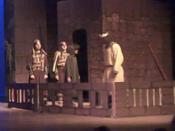"Think: all men make mistakes, but a good man yields when he knows his course is wrong, and repairs the evil: the only crime is pride." This quote means that all men make mistakes, and when a good man realizes his mistake he corrects it, even when it means admitting that you did something wrong. A bad man would continue on his path regardless of the wrongs he is doing. I agree with this quote because no one is perfect and eventually everyone makes some kind of mistake. It can also be very difficult to admit your mistakes, but doing that shows that you know right from wrong. This quote can be applied to Shakespeare's Macbeth because although Macbeth knows his course is wrong he continues to make mistakes and therefore does not qualify as a "good man."
In the beginning of the play, Macbeth was a loved and respected general and one may assume that he was a good man.
However he was corrupted by the words of the witches. They greet Macbeth as "Thane of Glamis," "Thane of Cawdor," and "King hereafter." Since the only accurate greeting was "Thane of Glamis," he questions the significance of the other two. When his wife hears of the witches' words she urges him to kill Duncan and although he struggles with the idea and the guilt it brings, he goes along with the plan. Once Macbeth goes through with the murder his desire for power increases and he makes decisions to kill Banquo and the Macduff family on his own. However, murdering these people causes the struggle from within and the guilt obviously causes the visions of daggers and ghosts. Even these do not make him "repair the evil".
A main theme in Macbeth is the struggle for power.


